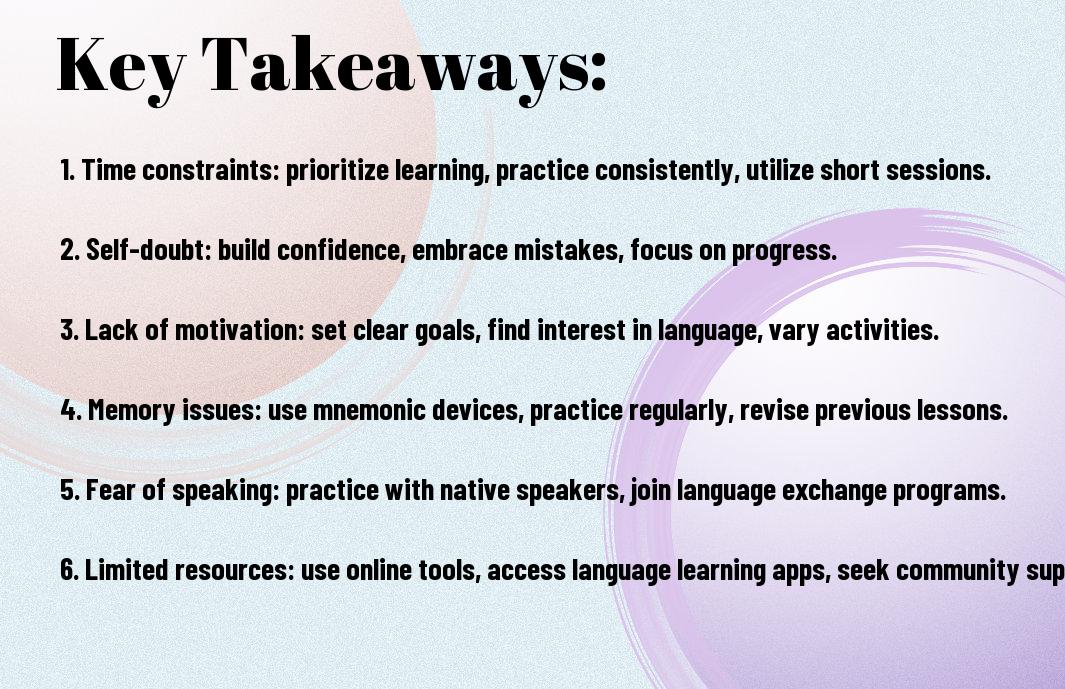With the world becoming increasingly interconnected, the ability to learn a new language as an adult is crucial. However, as an adult language learner, you may face challenges such as time constraints, fear of making mistakes, lack of immersion, and difficulty in retaining new vocabulary. In this blog post, we will explore these common hurdles and provide practical tips on how you can overcome them to enhance your language learning journey. So, let’s dive in and discover how you can conquer these obstacles and become a more confident and proficient language learner!

Key Takeaways:
- Motivation is crucial: Adult language learners often face challenges such as lack of motivation, busy schedules, and competing priorities. It is important to set clear goals, find meaningful reasons to learn the language, and stay committed to the learning process.
- Practice and consistency are key: Consistent practice is necessary for language learning. Adults should create a study routine, practice regularly, immerse themselves in the language through various activities, and seek opportunities to use the language in real-life situations.
- Overcoming fear of making mistakes: Fear of making mistakes can hinder adult language learners’ progress. It is important to remember that making mistakes is a natural part of the learning process. Learners should embrace their mistakes, learn from them, and use them as opportunities to improve their language skills.

The Struggle is Real
While commenceing on your journey to learn a new language, you are likely to encounter a multitude of challenges that can make the process seem daunting. From linguistic barriers to cultural differences, these obstacles can sometimes hinder your progress and leave you feeling frustrated. However, with the right approach and strategies, you can overcome these challenges and make significant strides in your language learning journey.
Linguistic Barriers
Barriers such as grammar rules, pronunciation differences, and complex sentence structures can make it difficult for adult language learners to grasp a new language. These challenges can be particularly daunting if the new language belongs to a different language family or has a writing system that is vastly different from your native language. To overcome linguistic barriers, it is imperative to practice regularly, engage with native speakers, and seek the help of a tutor or language exchange partner who can provide guidance and feedback.
Cultural Differences
Linguistic challenges are often intertwined with cultural differences, as language is deeply connected to a society’s beliefs, customs, and values. Understanding the cultural context of a language is crucial for effective communication and language proficiency. By immersing yourself in the culture of the language you are learning—through music, films, literature, and social interactions—you can gain a deeper appreciation for the language and overcome cultural barriers that may impede your progress.
Cultural differences can also manifest in language etiquette, body language, and expressions that may not have direct translations in your native language. By being open-minded and curious about different cultural norms and practices, you can navigate these differences with respect and sensitivity, ultimately enhancing your language learning experience.

Fear and Self-Doubt
Any adult language learner can relate to the feelings of fear and self-doubt that often accompany the language learning journey. These emotions can stem from various sources such as the fear of making mistakes, feeling embarrassed about speaking incorrectly, or doubting your ability to master a new language. In this chapter, we will explore how you can overcome these challenges and build your confidence as a language learner.
Overcoming Embarrassment
For many adult language learners, one of the biggest hurdles to overcome is the fear of embarrassment. You may worry about mispronouncing words, using incorrect grammar, or not being understood by native speakers. However, it’s necessary to remember that making mistakes is a natural part of the learning process. In fact, embracing your mistakes and learning from them is one of the most effective ways to improve your language skills. In the article How To Overcome Struggles Faced by Adult Learners …, you can find valuable tips on how to navigate through these feelings of embarrassment and turn them into opportunities for growth.
Building Confidence
Any adult language learner can attest to the fact that confidence plays a crucial role in language acquisition. When you believe in your abilities and approach language learning with a positive mindset, you are more likely to succeed. Building confidence in your language skills involves practicing regularly, setting achievable goals, and celebrating your progress along the way. Additionally, surrounding yourself with a supportive language learning community and seeking feedback from native speakers can boost your confidence and motivation.
Understanding that everyone makes mistakes and that language learning is a journey with ups and downs can help you build the confidence needed to overcome challenges. By embracing your mistakes, setting realistic goals, and seeking support from fellow learners, you can cultivate a strong sense of confidence in your language learning abilities.
Time Management and Prioritization
Many adult language learners struggle with finding enough time in the day to dedicate to language learning amidst their various responsibilities. Scheduling language learning sessions can be a challenge, especially when juggling work, family, and other commitments. To overcome this challenge, it’s vital to block out specific times in your daily or weekly schedule dedicated solely to language learning. By treating these learning sessions as non-negotiable appointments, you prioritize language learning and ensure it receives the attention it deserves.
Scheduling Language Learning
On your calendar or planner, designate specific time slots for language learning, and try to stick to them as closely as possible. Whether it’s early in the morning before the day gets hectic or late at night when things wind down, find a time that works best for you and make it a consistent part of your routine. Do not forget, consistency is key in language learning, so establishing a regular study schedule will help you progress more effectively.
Staying Motivated
The journey of learning a new language can be long and challenging, leading many adult learners to feel demotivated at times. The key to staying motivated is to set clear and achievable goals for yourself. Break down your language learning journey into smaller milestones, such as learning a certain number of new words per week or holding a basic conversation within a specific timeframe. Celebrate your achievements along the way to keep yourself motivated and engaged with the learning process.
Additionally, surrounding yourself with the language you’re learning can also help keep you motivated. Listen to music, watch movies or TV shows, or follow social media accounts in the target language to immerse yourself in it outside of study sessions. This constant exposure will reinforce your learning and make it feel more relevant and enjoyable.
Learning Styles and Strategies
After reading about the common challenges faced by ESL students, it’s crucial to understand that each person has a unique way of learning. Finding the right method that suits your learning style is crucial. Some people learn better through visual aids, while others prefer auditory or kinesthetic methods. Experiment with different techniques to see what works best for you. Don’t be afraid to mix and match various strategies until you find the ones that resonate most with you.
Finding the Right Method
To make the most of your language learning journey, it’s vital to identify the methods that cater to your individual learning style. Visual learners may benefit from using flashcards, videos, or colorful mind maps. Auditory learners could find listening to podcasts, music, or language audio lessons helpful. Kinesthetic learners might prefer using gestures, acting out scenarios, or engaging in hands-on activities to reinforce their language skills. By understanding how you learn best, you can tailor your study approach to optimize your language acquisition.
Using Technology to Your Advantage
For modern language learners, technology offers a wealth of resources to enhance your learning experience. Online language courses, language exchange apps, and interactive learning platforms provide flexibility and convenience. You can access a vast array of digital tools to practice reading, writing, speaking, and listening skills. Integrating technology into your language learning routine can make studying more engaging and interactive. Take advantage of language learning apps, video tutorials, and social media language groups to immerse yourself in the language and connect with other learners worldwide.
Advantage
Incorporating technology into your language learning journey can expose you to authentic language use, cultural insights, and real-life scenarios. Language learning apps often incorporate gamification elements to make studying enjoyable and motivate you to progress. Additionally, digital platforms offer instant feedback on your exercises, pronunciation, and language comprehension, allowing you to track your improvement over time. By leveraging technology effectively, you can turn your device into a powerful language learning tool that complements traditional study methods.
Practice, Practice, Practice
On your language learning path, consistent practice is key to mastering a new language. Dedicate regular time to practice speaking, listening, reading, and writing in the target language. Practice not only improves your language skills but also boosts your confidence in using the language. Engage in conversations with native speakers, join language exchange programs, or participate in language meet-up groups to apply what you’ve learned in real-life situations. The more you practice, the more comfortable and proficient you’ll become in the language.
It
It’s crucial to create a study routine that includes daily practice sessions and opportunities to interact with the language. Set specific language learning goals and track your progress to stay motivated and focused. Embrace your mistakes as part of the learning process and learn from them. Regular practice, combined with a positive attitude and perseverance, will significantly enhance your language proficiency over time.
Overcoming Plateaus
Identifying Stagnation
Now, as you progress on your language learning journey, you may encounter times when you feel like your improvement has stalled. Any language learner experiences plateaus, where your skills seem to hit a ceiling, and no matter how much effort you put in, you don’t seem to be moving forward.
It’s vital to recognize when you’ve reached a plateau so that you can take steps to overcome it. Reflect on your recent progress and be honest with yourself about whether you’ve stopped advancing. Identifying stagnation is the first step towards reigniting your language learning momentum.
Shaking Things Up
An effective way to overcome plateaus is to shake things up in your learning routine. Try experimenting with different study methods, resources, or even change the setting where you typically practice. An abrupt change in your routine can reignite your motivation and stimulate your brain in new ways.
By introducing variety into your learning process, you can keep things fresh and challenging. For example, if you’ve solely focused on vocabulary drills, switch gears and engage in conversational practice with a language exchange partner. This change can help break the monotony and push you past the plateau.
With a bit of creativity and willingness to step out of your comfort zone, you can find innovative ways to keep your language learning journey engaging and rewarding.
Seeking Feedback
Plateaus are a common occurrence in language learning, but they don’t have to hinder your progress indefinitely. Seeking feedback from teachers, tutors, or even fellow language learners can provide you with valuable insights into areas where you may be stuck.
Feedback can help you pinpoint weaknesses in your language skills and guide you on how to address them effectively. Additionally, receiving encouragement and constructive criticism from others can reignite your motivation and drive to push through the plateau.
Stagnation is a natural part of the language learning process, but with the right strategies and support, you can overcome these challenges and continue advancing towards your fluency goals.
The Power of Community
Unlike learning in isolation, being part of a community can greatly enhance your language learning journey. Engaging with others who are also on the same path can provide motivation, support, and valuable opportunities to practice and improve your skills.
Joining Language Exchange Groups
To maximize your language learning experience, consider joining language exchange groups in your local community or online. These groups typically consist of language learners who are looking to practice with native speakers in a conversational setting. By participating in these exchanges, you can not only improve your language skills but also gain cultural insights and make new friends.
Finding a Language Buddy
Buddy
It’s important to find a language buddy who shares your goals and interests in language learning. This person can be a native speaker of the language you are learning or someone at a similar proficiency level. Having a language buddy gives you a dedicated partner to practice with, ask questions, and keep each other accountable in your learning journey.
Online Resources and Forums
The
Online resources and forums are valuable tools for adult language learners. Platforms like language learning apps, online forums, and social media groups provide access to a wealth of information, language exchange opportunities, and support from a global community of language enthusiasts. You can find study materials, language exchange partners, and even virtual language meetups to practice speaking and listening skills.
Online resources and forums offer flexibility and convenience, allowing you to engage with language learning whenever and wherever you are. Whether you have a quick question, need help with a particular grammar rule, or want to practice speaking with a native speaker, these online platforms are accessible 24/7 to support your language learning journey.
Final Words
Upon reflecting on the common challenges faced by adult language learners, it is clear that there are various obstacles that can hinder your progress. However, by recognizing these challenges and implementing effective strategies, you can overcome them and achieve your language learning goals. Remember to stay patient and consistent in your efforts, as language acquisition is a gradual process that requires time and dedication.
It is important to stay motivated and find ways to make your language learning experience enjoyable. Surround yourself with the language as much as possible, practice regularly, and seek support from peers or language instructors when needed. By staying positive, setting realistic goals, and utilizing available resources, you can navigate through the challenges of adult language learning and make significant progress in mastering a new language.
Q: What are the common challenges faced by adult language learners?
A: Adult language learners often face challenges such as limited time due to work or family commitments, difficulty in retaining new vocabulary, and fear of making mistakes when speaking.
Q: How can adult language learners overcome the challenge of limited time?
A: Adult language learners can overcome the challenge of limited time by setting aside small, consistent blocks of time each day for language practice, utilizing apps or online resources for on-the-go learning, and incorporating language learning into daily activities like commuting or chores.
Q: How can adult language learners overcome the fear of making mistakes when speaking?
A: Adult language learners can overcome the fear of making mistakes when speaking by practicing speaking with a language partner or tutor who provides supportive feedback, focusing on progress rather than perfection, and embracing mistakes as a natural part of the learning process.


